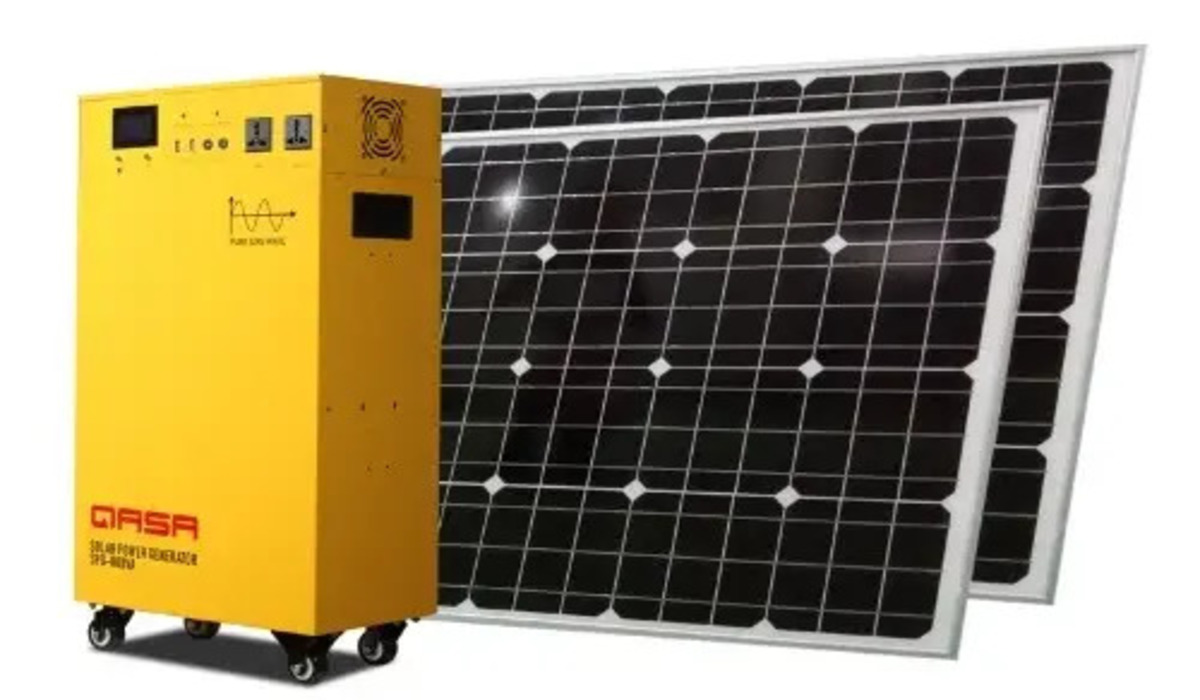The price of a solar generator in Nigeria varies widely depending on the size, brand, battery capacity, and additional features. Here is a general breakdown of typical prices:
- Small Solar Generators (for basic needs like charging phones and small lights): ₦70,000 – ₦200,000
- Medium Solar Generators (for powering TVs, fans, and a few other small appliances): ₦200,000 – ₦500,000
- Large Solar Generators (for heavy-duty use, like refrigerators, air conditioners, and multiple appliances): ₦500,000 – ₦2,000,000 or more
Let’s look at each category to see what you get for your money.
Small Solar Generators (₦70,000 – ₦200,000)
Small solar generators are ideal for simple power needs, such as charging phones, lighting, and maybe powering a small fan. These generators usually come with a small battery capacity and limited output. They’re compact, portable, and budget-friendly.
- Popular Brands: Some common brands in this category include EcoFlow, Beebeejump, and Poweroak.
- Power Range: Typically, these solar generators provide 150-300W of power.
- Price Range: ₦70,000 to ₦200,000, depending on brand and capacity.
Medium Solar Generators (₦200,000 – ₦500,000)
Medium-sized solar generators are suitable for those who want to power a few more appliances, like a TV, laptop, multiple lights, and fans. They have higher battery capacities and may even power a small refrigerator.
- Popular Brands: Brands like Jackery, Bluetti, Bebeejump, and Goal Zero fall into this category.
- Power Range: These generators typically offer 500W – 1000W, enough for home backup power.
- Price Range: ₦200,000 to ₦500,000, based on power output and storage capacity.
Large Solar Generators (₦500,000 – ₦2,000,000+)
Large solar generators are designed for high power demands, ideal for homes that need backup for larger appliances such as refrigerators, air conditioners, and multiple lights. They come with larger batteries and powerful inverters to handle bigger loads.
- Popular Brands: Brands like EcoFlow Delta, Bluetti AC200P, Qasa, and are popular choices.
- Power Range: They provide power output of over 1000W and can go up to 3000W or more.
- Price Range: ₦500,000 to ₦2,000,000+, depending on the brand and power capacity.
Factors Affecting Solar Generator Prices in Nigeria
Several factors influence the price of solar generators in Nigeria. Here are some key ones:
- Battery Capacity: Higher battery capacity means more stored energy, which allows the generator to power devices for a longer time. Generators with larger battery capacities are more expensive.
- Power Output: Solar generators with higher wattage can support more appliances. Larger wattage generators are more costly but can handle heavy loads.
- Inverter Type: The type of inverter (pure sine wave or modified sine wave) can affect the price. Pure sine wave inverters are usually more expensive but better for sensitive electronics.
- Additional Features: Some solar generators come with added features, like fast-charging USB ports, wireless charging, and smartphone app control, which can increase the price.
Where to Buy Solar Generators in Nigeria
You can find solar generators in various stores across Nigeria, both online and offline. Here are some of the most popular places to buy them:
- Online Stores: Websites like Jumia, Konga, and SolarKobo offer a range of solar generators. These platforms often have different brands, allowing you to compare prices and features easily.
- Local Electronics Stores: Many electronics stores in major cities like Lagos, Abuja, and Port Harcourt stock solar generators. Some reputable stores include Sukam Nigeria, Arnergy, and Green Power.
- Specialized Solar Shops: Some shops specialize in solar products, including generators, batteries, and panels. They may offer installation services and advice on choosing the right generator for your needs.
- Direct from Manufacturers: Certain brands have local distributors or representatives in Nigeria. Buying directly can sometimes be cheaper and gives you access to customer support from the brand itself.
Benefits of Using Solar Generators in Nigeria
Using a solar generator offers many advantages, particularly in Nigeria, where power interruptions are common:
- Eco-Friendly: Solar generators use renewable energy, reducing the reliance on fossil fuels. They don’t produce emissions, making them an environmentally friendly option.
- Cost Savings: Although solar generators have a higher initial cost, they’re cheaper to maintain and don’t require fuel, saving you money over time.
- Quiet Operation: Unlike fuel-powered generators, solar generators are quiet and won’t disturb the peace at home or in your business.
- Backup Power: They offer a reliable backup power source during power outages, keeping essential appliances running without interruption.
Choosing the Right Solar Generator for Your Needs
When deciding which solar generator to buy, it’s important to assess your power needs:
- Determine Your Power Requirements: Consider the devices you want to power. Make a list of their wattages and add them up to see which size of solar generator will fit your needs.
- Check for Portability: If you plan to use your generator outdoors or on camping trips, look for a model that’s lightweight and easy to carry.
- Battery Capacity and Charging Speed: A generator with a high-capacity battery and fast charging will be more convenient, especially if you rely on it as your main power source.
- Look for Warranty and Support: Make sure the generator you choose has a warranty and access to support in Nigeria.
Final Thoughts: Is a Solar Generator Worth the Price?
Solar generators are a smart investment, especially in Nigeria where electricity can be unreliable. While they may cost more upfront compared to traditional fuel generators, solar generators pay off in the long run due to their low operating costs and positive environmental impact.
If you’re looking for a quiet, clean, and reliable power solution, a solar generator could be the perfect choice. Whether you need one for emergency backup, everyday use, or outdoor activities, there’s likely a model that fits both your power needs and budget.
